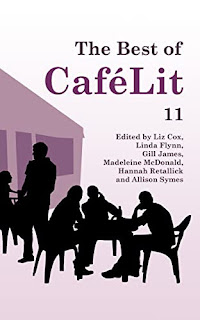Anything and everything.
Tell me more:
In 2022 my aim was to submit something somewhere once a week to competitions or anthologies that either paid a cash prize or rewarded authors indirectly by publishing under an ISBN number. Alas, online magazines that fill their pages by asking authors to work for no pay are mushrooming, and are to be avoided like the plague.
I am grateful to those generous writers who donate their time and effort to spread the word among fellow scribes by posting lists of worthwhile opportunities on the Internet.
In terms of success, in 2022, I had three short stories, and two non-fiction pieces published. 2023 has started well, with the publication of one poem and two cosy crime shorts.
A new departure for me was selecting and introducing stories for The Best of Cafe Lit 11. All the authors published on the CafeLit website are good writers, and selecting only a few took careful thought.
Tell me about a
writing-related event from last year
The success I relished the most was to win Press 53's monthly competition to tell a story in 53 words exactly, after submitting to them for years. Their contest is great fun and I shall carry on trying.
Learn more about Madeleine here.

